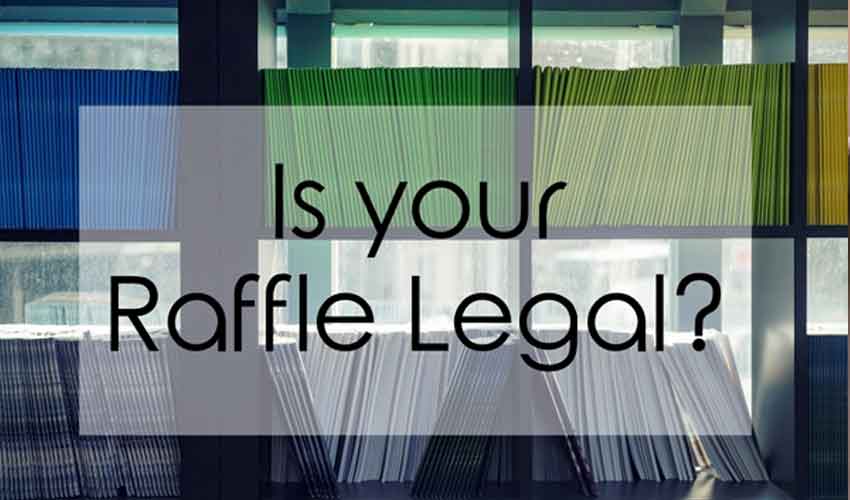Almost everybody has participated in raffles for a good cause, supporting a church, a school, or a local sports team. Raffles are excellent fundraisers, but they have legal restrictions, too. If you want to run a raffle yourself, you should get to know how to do them right.
Before starting operating a raffle business, be sure to get current legal advice for your situation.
Raffles Definition & Regulations
A raffle is a form of gambling where people pay money to buy tickets that give them chances of winning prizes. The winner is drawn from all entries, meaning the winner is determined randomly.
If you’re using a raffle as a fundraiser, you’re holding a personal raffle — a raffle that’s offered by an organization and not the government. This is important because of how similar raffles are to lotteries.
Raffles and lotteries both have the same three defining elements:
- Consideration (money is paid for the tickets)
- A prize with monetary value
- The winner is drawn by luck
In many countries, including the United States, personal lotteries are prohibited. Only the government is legally allowed to run lotteries.
Raffles have all three elements, which would technically make them prohibited. However, many jurisdictions make exceptions for fundraising raffles. Exceptions are made for certain types of organizations, for raffle prizes that are worth under a certain amount, and other reasons.
Running a Legal Raffle in the United States
In the United States, raffles are controlled by a combination of state and federal law. That means that whether you’re able to run a raffle, and what you have to do to ensure that the raffle meets all legal requirements, varies depending on where you are located.
Currently, raffles are legal with various restrictions in 47 of the 50 states. The states that prohibit raffles altogether are Alabama, Hawaii, and Utah.
So to find out what you need to do to run a legal raffle, consult with a gaming lawyer, which will give you the most current and reliable raffle information.
How to Run a Legal Raffle in Canada
Canada allows charitable organizations, and only charitable organizations, to hold raffles as fundraisers and the details vary by province.
Raffle laws are handled by three different groups: the Criminal Code of Canada, the Competition Bureau Canada, and local municipalities.
Ontario: Depending on the size of the prizes to be awarded, charitable organizations in Ontario need to apply for either a municipal or a provincial license.1. Businesses must prove eligibility. To qualify, they must be a charitable organization that has been in business for at least a year and has a location in Ontario.
British Columbia: Raffles in British Columbia are regulated by the Gaming Policy and Enforcement Branch (GPEB) of the province’s government. To be eligible, you must have a not-for-profit or community organization that is raising funds to benefit the community. You must apply for a license in advance.
Quebec: Three types of organizations can run raffles in Quebec: those donating the money to charity, people who are operating a fair or exhibition, and vendors at a fair or exhibition with a concession license. Get more details from Canada Ticket Printing.
Alberta: Raffles in Alberta are managed by the Alberta Gaming & Liquor Commission (AGLC). Non-profit and community organizations must first prove they are eligible, and then they must apply for a license before running a raffle.
Nova Scotia: Charities, religious organizations, and non-profit community organizations can legally run raffles in Nova Scotia if they apply for a license in advance. See the Nova Scotia Alcohol and Gaming Division website to apply or to get more information.
Saskatchewan: Before you run a raffle in Saskatchewan, you need to submit documentation to the Saskatchewan Liquor and Gaming Authority (SLGA). You’ll need to prove that your organization is an eligible non-profit and provide some information about the raffle. Your license fees will depend on the size of the raffle you are running.
Newfoundland and Labrador: Several types of groups can run raffles in Newfoundland and Labrador, according to the Newfoundland and Labrador government website. Examples include nonprofit fire departments, church groups, colleges, scout groups, and more. A specific person in each organization must apply for a license in advance.
Manitoba: The Liquor, Gaming, and Cannabis Authority of Manitoba allow charitable and religious organizations to run raffles; they also allow one-off raffles for certain social occasions. All raffles must be licensed in advance.
Prince Edward Island: Prince Edward Island has very specific requirements about who can run raffles. For example, only non-profit and charitable organizations can apply, and the funds raised by the raffle must be used for specific causes. You can read more about them on the PEI government website.
New Brunswick: Legal lotteries may be held only by charitable organizations, and the money raised by the raffle must be used for a charitable object or purpose. If the value of the prizes to be raffled off is less than $500, you can apply for a simple permit. Otherwise, you’ll need to get a license in advance. See the New Brunswick Government website for more information.
If you have any questions about whether your raffle is legal or whether you have gone through all of the necessary steps, it’s always wise to consult a lawyer who is knowledgeable in the subject. Making a mistake can be a costly, and even criminal, offense.
Now is the time to secure a significant chunk of the available market.
Szilaghi Consulting offers consultancy services and complete package solutions for gambling license acquisition that include:
- Gambling jurisdiction and business advisory
- Gambling business corporate structure incorporation
- Opening bank accounts
- Gambling license application


